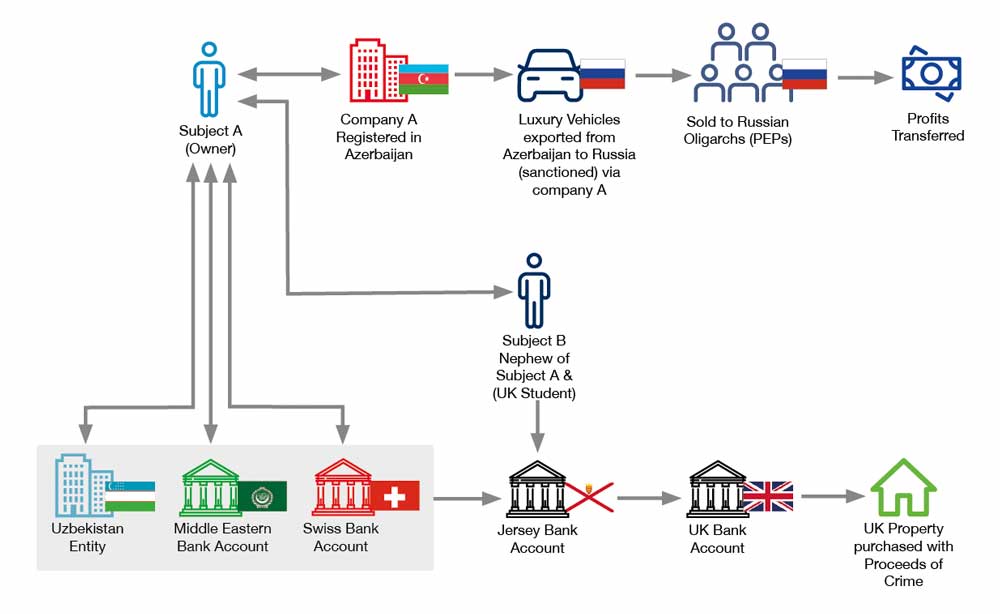Sanctions against Russia, after the invasion of Ukraine, resulted in the prohibition of the import of luxury goods, including high-end vehicles. Despite these restrictions, luxury cars have continued to surface within Russia, prompting concerns about the existence of a sophisticated sanctions circumvention network.
One individual of interest is Subject A, a Politically Exposed Person (PEP) from Azerbaijan and a known business figure, who is suspected of facilitating the supply of European luxury vehicles to Russian clients via one of his twenty businesses. Subject A’s nephew, Subject B, is a dual Azerbaijani and British national who resides in the UK as a student.
Since February 2025, GBP 2.8 million has flowed through Subject B’s newly opened bank account located in Jersey. The account has mainly been funded from an entity in Uzbekistan, and his uncle and aunt (Subject A being his uncle) via accounts in the Middle East and Switzerland.
Subject B has declared that the funds have been utilised to purchase UK property. However, the origin of the funds, particularly those linked to Subject A, raises significant concerns. It is suspected that these may represent the proceeds of crime, specifically derived from the circumvention of sanctions through the illicit importation of luxury vehicles into Russia via Azerbaijan. Thus, it is highly likely that the property purchased in the UK may be the end product of the sanctions circumvention scheme.

OCGs are structured criminal organisations that engage in illegal activities for profit. These groups often operate hierarchically, with defined roles and responsibilities among members. OCGs may be involved in a variety of illicit enterprises, including drug trafficking, human trafficking, arms smuggling, extortion, money laundering, and racketeering.
Typically characterised by their secrecy and sophistication, OCGs utilise corruption, violence, and intimidation to maintain their operations and protect their interests. They often have connections to legitimate businesses, which they may use to launder money or further their criminal activities. The influence of OCGs can extend across borders, making them significant players in international crime networks.
The presence of OCGs poses serious challenges to law enforcement agencies, as their operations are often well-coordinated and strategically planned. Efforts to dismantle these organisations require cooperation between national and international authorities, as well as community involvement to address the social issues that allow organised crime to flourish.
Sanctions evasion refers to the act of circumventing or violating economic sanctions imposed by governments or international bodies. These sanctions are typically put in place to restrict trade, financial transactions, or other interactions with specific countries, entities, or individuals due to political, military, or human rights concerns. Evasion can take various forms, such as using third-party countries to conduct transactions, falsifying documents, or employing complex financial networks to disguise the origin or destination of goods and services. Companies or individuals engaging in sanctions evasion risk legal penalties, including heavy fines and criminal charges, and contribute to undermining the effectiveness of international sanctions designed to promote global stability and uphold human rights.
We continually strive to enhance the quality of the products we produce, from our typologies to reports, Insight papers to training guides. However, we can only improve if you share your feedback with us about what you think about them. This is your chance to let us know and we appreciate it your feedback. Click the navy button below or scan the QR code.
Tell us what you think >.svg)